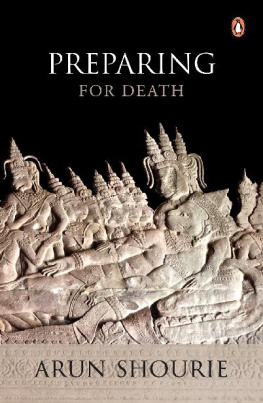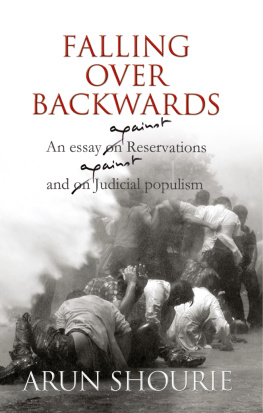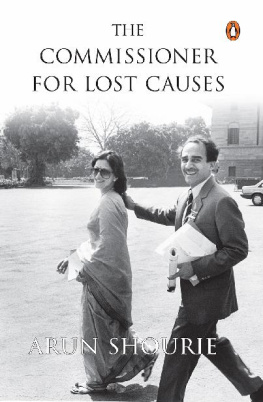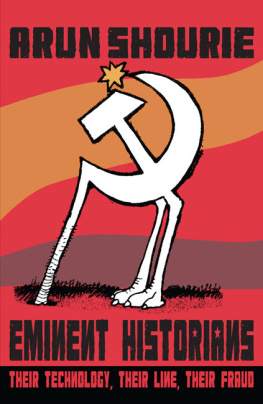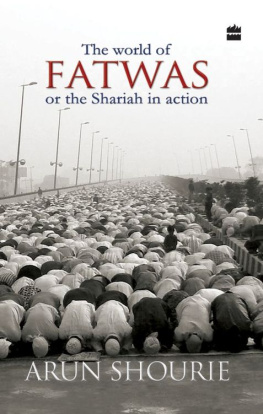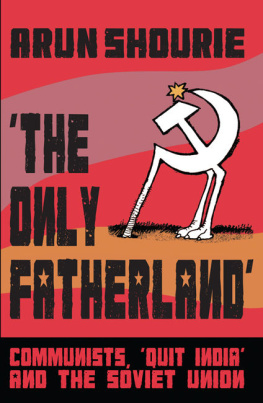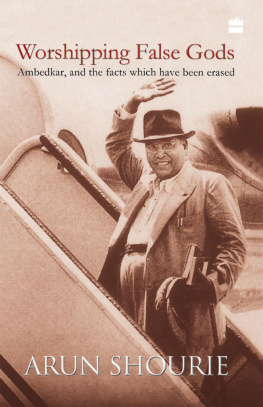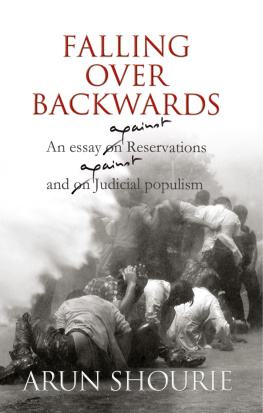ARUN SHOURIE
PREPARING FOR DEATH
Contents
Death is certain; its time, place, manner completely uncertain. Learning from the great: how the way they lived prepared them for the deaths they had
The Buddhas final years. The mundane difficulties he had to facefrom calumny to assassination attempts. His calm abiding. His compassion. His final teaching and words. His passing
A life that enables us to see God face to face... Sri Ramakrishnas fragile body. Extreme infirmities and indescribable pain of his final years. How could cancer strike him? Why dont you cure yourself? Omens and other questions
Sri Ramanas nobility, humility, mesmeric magnetism. Cancer strikes even him. Painful operations, painful waning. Eternal questions, eternal answers. The real disease. His ethereal calm. Compassionate to the end. I am going nowhere. Where can I go? A shooting star
Gandhiji incarcerated again. Deep wound of Kasturbas death. Pacifies the violent all round. Anguished by developments. Continues his incalculable work in spite of hostility, assassination attempt. When would he have made good the claim? Perfect end
Vinobas life and work. Continuous contemplation of death. Progressive disengagement from work and interests. Decides to fast unto death. Turns down pleas to end it. A yogis end
Lessons from the preceding accounts. Paths prescribed according to aptitude and stage of aspirant. Putting obstacles to work for inner growth. Disciplining body and mind. Humility. Our utter insignificance. Premonitions?
Anaesthetics we use to imagine death is not the end. Worship, mantras, rituals, gurus converted into currency notes. Contrasted with what we have been taught. Some of the lessons the passing of our parents taught me
Revered Jain practice for voluntary exit. Preconditions. Prolonged preparations. Steps to extinction. Evolution, significance of the practice. Lessons from its institutionalization, ritualization
Sannyasa: origins. Dying to present life. Steps to and constituents of. Perils in, and how to proceed on an ego suicide mission. Flawed allurements. In pristine form, so well-crafted by originators, and transformed by reformers
Transitions. Significance of turning points. A text for the living. Salutary diagnoses, salutary prescriptions. Deities, journeys, visions as emanations from our minds. Hence, liberation is in our hands. But that requires great effort, great care, long, intense preparation
Wrathful as well as benevolent deities reside in our hearts. Both help. As objects of meditation. Alternatives to going on cursing ourselves for being sinners
Dwelling in clear light. Aspirational prayers and altruistic motivation. Actual deeds and experience of true nature of mind instead of mere learning. A fundamental difference, but beyond our present concerns
The Advaitins view: as I am not the body, I was never born, shall never die. Hence, no reason to mourn. But will these words console? Who then am I? The heart on the right side. A Zen koan? Sri Ramanas direct method
The Buddha instructs a friend. Death contemplations. Lessons along the way. A famous courtesan. Denigrating the body to dissolve attachment. Denigration carried too far. An antidote
Settling mundane affairs. For a serene deathvirtue and insight. Touchstone for assessing rival teachings. Teachings in accordance with needs of learner. Read your heart more than texts. Being an island
Disciplining the mind with the mind. Not just for the moment. Everything teaches: ageing, disturbances, anger, pain, enemies. Prerequisites for learning from them. Not carrying devices or notions too far. Wise selfishness. The clever adversary
A visit to the departure lounge. My saviours: skill of surgeons, love of loved ones, generosity of so many. The devices that help me. Gratitude, guilt. A Dalai Lama answer
Not losing ones way in the maze of unanswerable questions. A savants counsel: look for what helps you. And so, a book on death ends in a joke!
For
so many loved ones
who have already passed away
The yellow rose
petalsone by onegone into
roaring waterfalls
Basho
Once when the Blessed One was living at Savathi in the Eastern Monastery, the Palace of Migaras Mother, he had risen from retreat in the evening and was sitting warming his back in the rays of the setting sun, we learn. As Ananda was massaging his limbs, he noticed the changes that had overtaken the Buddha, and mentioned them.
So it is, Ananda, so it is, the Buddha replied. Youth has to age, health has to sicken, life has to die. Now the colour of my skin is no more clear and bright; all my limbs are flaccid and wrinkled, my body is bent forward, and there seems a change in the sense faculties of my eyes, ears, nose, tongue and bodily sensation, so the Blessed One said.
When the Sublime One had said this, the Master said further:
Shame on you, sordid Age!
Maker of ugliness.
Age has now trampled down
The form that once had grace.
To live a hundred years
Is not to cheat Decay,
That gives quarter to none
And tramples down all things. *
* Samyutta Nikaya, 48.41; as translated by Bhikkhu Nanamoli in Life of the Buddha as it appears in the Pali Canon, the Oldest Authentic Record , Buddhist Publication Society, Kandy, Ceylon, 1972, p. 276.
Ram gayio...
Yaar, Arun, have you noticed one thing? my friend of sixty years or more asked as we sat through yet another memorial meeting. We now know more persons on that side of the LOC than on this.
One thing in the universe surely flies faster than lightand that is time. My mother lived till she was eighty-seven, my father till he was ninety-two. They lived full and long lives, everyone says. But for us, those noble lives fled past in a flash. Years have passed since they left, yet it seems just yesterday that we were all together. In turn, we are already our parents age: rushing past a windowpane, I catch a glimpse, not of me, but of my mothers eyes or my fathers forehead. The other day, Anita, now incapacitated in so many ways by Parkinsons and getting more and more dependent on one of Adits wheelchairs, said something heart-rending. I cant even imagine how I used to drive Adit to school, Anita said, and the car stalled, and I got down, lifted Adit out of the car and held him in my arms till help came. Similarly, when Anita and I chance upon a photograph of ours taken when we were young, we recognize the photograph, we may even remember the occasion when it was takenbut who are those two? Do we remember them ? What were they like, what were their hopes, their apprehensions...? We may say, O, I remember, we were so happy. But that is just a word: we do not feel what we felt at that moment. The feeling that might have flooded our bodies and minds then is just a word today.
A camp office
Just like those whom we dont know, our closest relatives, among them those whom we have loved the most, and our friends die ever so oftensome months it seems as if we have to set up a camp office at the Lodhi Road crematorium. Fed up, a relative has declared, I am not going to any more cremations. If possible, I will skip my own too. And ever so often they die absolutely unexpectedly. Anup, a cousin, innocent as a lamb, and like his parents an ardent devotee, was home for vacation; he lay down in a bed next to his parents, one gasp and he was goneI still remember his body being brought down the stairs, and my aunt, with nerves beyond my imagination, stitching a button which had come off the kurta in which the body was clad. Anup was not yet twenty-one. Vijay Devasher was quite the jewel of our family. Handsome, strong, always with a beaming smile, he was in the Indian Administrative Service; he had been sent to the US for studying ways to improve an agricultural practice. On return, he was posted as collector in Gulbarga. Feeling tired one day, he went early to play tennis; the game done, he started jogging around the court, and collapsed; next day, it seemed that the whole of Gulbarga had turned out for his cremation, so popular and effective an officer was he. He had just turned thirty-three.




